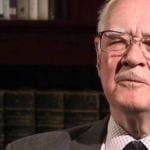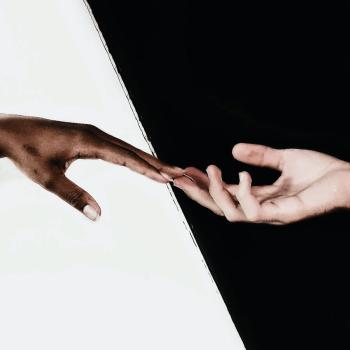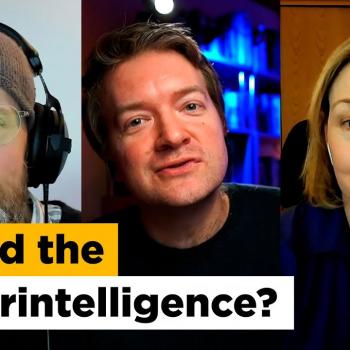 What would it take for you to move from staunch atheism towards Christianity? For Frank Federico, it was a combination of factors. Jana Harmon, whose PhD research is in adult conversion, shares a little of Frank’s story.
What would it take for you to move from staunch atheism towards Christianity? For Frank Federico, it was a combination of factors. Jana Harmon, whose PhD research is in adult conversion, shares a little of Frank’s story.
Frank was a thinker. He valued knowledge. In fact, he is a high school teacher whose prior atheism flowed from his belief in religion’s apparent irrationality, its irreconcilability with science, and apparent lack of objective or historical evidence. His resistance towards belief was reinforced by his admitted lack of desire due to what he had experienced with Christian hypocrisy, and lack of any positive personal experience with religion or God. For Frank, Christianity was neither attractive nor plausible, and he did not give it much thought except to dismiss it.
Early Years
Although 23 years removed from his conversion, Frank recalled his story as if it was just yesterday. He spoke with authority and precision, no doubt the result of years of class room instruction as a history teacher, telling his own history.
He was raised in an Italian family, attending Catholic schools. But for Frank:
“It was nothing but going to church. There was no community. We would sit in the very back seat of the church every Sunday. We would get their first and we would leave first. There was no interrelation with anybody.”
There were phases during which he was devout, participating in the church sacraments, completing Confirmation, and receiving communion, but he gave up religious belief into his teenage years. Frank reflected:
“I started to ask more questions about what we believe. My parents weren’t able to give me answers. It reached the point where I stopped going to church and there was not much they could do about it at 15.”
School Years
Frank’s doubt regarding the credibility of religious belief was compounded by the inability of his religious school teachers to provide substantive answers to his questions. He wondered how the supernatural nature of biblical stories could fit with his science education. For Frank, religion had no intellectual credibility:
“If you are going to believe something, you have to have good grounds for it. And I didn’t believe that anyone who had a faith had any good grounds. I thought it was for less educated people. It was a superstition that gave comfort, but I was not interested in that.”
Reinforcing his doubts, Frank’s sceptical friends dismissed religion and its moral mandates. They didn’t want Christianity to be true and neither did he. He explains:
“I didn’t care about religion because it just did not suit the kind of person that I was at that time. Religion imposes morality and I didn’t want that either. I just didn’t want to know. Disbelief fit in nicely with where I wanted to be, because I honestly didn’t want moral constraints. I wanted to let loose, to try anything. I lived a highly immoral life. I justified all of these vices and I didn’t care. We lived a life of debauchery and never thought twice about it because we saw it on TV. That’s what young people do.”
University Years
In time, Frank moved from mere indifference towards religion to antagonism:
“When I got into university, I really was quite hostile to anyone who wanted to talk with me about faith because I thought that belief was nonsense. I thought, ‘You don’t even know why you believe what you do. You have been brainwashed to believe this.’ I was resentful of what I thought had been misleading teaching…I thought of Christianity as a cult, Christians as fanatics.”
As an atheist, Frank knew he was against religion but admittedly he had not examined his own atheistic presumptions:
“I wasn’t an informed atheist. I wouldn’t have known all of the arguments that I have now read and been exposed to as a Christian. It wasn’t a sophisticated atheism.”
As someone who loved history, he had believed sceptical television documentaries undermining the reliability of the New Testament biographies of Jesus. As someone who respected science, he had embraced the view that evolution disproved the need for God. Admittedly, he hadn’t thought much beyond that.
Frank’s atheism became a comfortable identity. A life without God was his “state of play” until, at the age of 27, he met a new teacher at his school who disrupted his understanding of Christians and Christianity through an unexpected encounter.
A Significant Bus Ride
Four years into his career as a high school teacher, he was responsible for organizing and staffing a school camp. Another teacher, David, had been recommended as a potential camp chaperone, but it wasn’t a welcomed suggestion. Frank recalled:
“The only thing I knew was that he was a science teacher and a Christian, and for me that made no sense. I didn’t want to know this guy. I didn’t want to have much to do with him.”
But Frank’s hope of avoidance was not realized. On the morning of camp departure, the only spare seat on the bus was next to David. It was only an hour ride, but this unexpected meeting opened him towards reconsidering his views about belief in God.
“This encounter was a transformative conversation. This was the change. This was the first time that I had met a Christian who was intelligent or seemingly intelligent who could answer some of the questions that I had. I raised objections to Christianity, like the Crusades, and he agreed that they were problems and I did not expect that. I talked about issues of science with him. How can you believe when you are a scientist? He gave me some explanations.
He was a humble sort of character and that was also disarming. I was prepared to get into a real argument and he wasn’t that type. I found this whole experience quite strange because I had spent an hour talking to him and I realized that he is a really nice person, and I enjoyed having this conversation. He made me think about some things that I had not really thought about. He certainly didn’t convert me in that conversation. But, what he did was break down some barriers for me…It was an eye-opener.”
A Significant Book
An avid reader, Frank was in a book club promoting history books. The week following camp, the club’s ‘book of the month’ was entitled Jesus, The Historical Evidence. Apart from his pivotal conversation with David, he would have ignored it altogether. Reading the book in order to disprove Christianity, Frank was surprised at its contents:
“I was completely besotted with this 300-page book. I read it in two days. This book actually disproved what I believed about the unreliability of the New Testament. It argued that the New Testament is essentially reliable, the Gospels were written within the lifetime of eyewitnesses, and there is archaeological evidence which confirms the data in the Gospels. No longer were these books myths for me. They were actually works of history…
The ultimate question for me was ‘Why did the early Christians believe this? Why did they go through the amount of suffering that they did?’ They could have just as easily been quiet. I looked at alternative explanations for their behavior. Bringing it back to a first century origin made a difference for me. Again, it didn’t convert me, but what it did was to remove one of the biggest obstacles to trust in the Christian message, and that is that there are grounds for belief.”
Although Frank was surprised at the book’s convincing substance, he continued to resist:
“My desire was not to believe. My desire was to disprove this. But, as I was doing that, I was reading things that were challenging my unbelief. And, I wasn’t expecting that. There were still plenty of things that didn’t make sense, so I wrote those things down and I went back to David and asked him if he wouldn’t mind answering some of my questions. He was more than willing. At the time, I would not have expected that. At the time, I would not imagine that someone wanted to talk about these things.”
Significant Conversations
Frank wasn’t expecting a Christian, David, to be intelligent, willing to engage in reasonable, evidenced-based discussion about science or about the bible. But it made a difference:
“Talking to someone like David who is a science teacher and a believer in God got rid of the idea that the two were incompatible, but that science and the existence of God can coalesce. I wanted to meet someone with the integrity and intelligence, chiefly coming from the science realm, who could allow me the possibility of thinking that a God does exist…So, if it is possible to believe in God, of course miracles can happen. And given that so much of the historical narrative has been shown to be historically reliable, then why not also those components?”
Frank and David met weekly to address lingering questions. Eventually, he began to read the New Testament, starting with the book of Acts since he thought it to be a historical book, underlying in red pen everything that didn’t make sense. Frank then met with David to talk discuss what he was reading, remaining inwardly resistant:
“My attitude was still one of unbelief and hostility. I challenged everything. I threw everything at him. I grilled him all of the time. But there were answers! The more time I spent time with him, the more I got to like him. We spent hours talking and we actually developed a friendship. We had a lot of things in common…There was this relationship developing which was completely unexpected.”
Clarity
For Frank, these weekly discussions brought more clarity as to what Christianity is not as well as what it actually is, changing his willingness to reconsider both its truth and its goodness.
“I found that as I was reading through Acts and as I moved on to the letters of Paul, I was learning so much. I could see that Christianity is good in its purest form. There were still things I didn’t believe and found hard to accept, but the message itself as I came to understand it was just not something that I could hate anymore.
We read through a little book – seven steps for what Christians actually believe. There was a chapter about grace that was transformative because I felt the weight of that message, that we are not saved by our works. I grasped the forgiveness of Christ and my unworthiness. When you believe ‘You can make up for your own sins’ then you keep on trying hard and Jesus is not so significant. When the message is, ‘You can’t make up for your own sins and you have to depend entirely on Jesus’ it caused me to think about all of my sins and everything that I have done.
I said, ‘I can’t believe this! This is overwhelming. I have done so many wrong things, how can he possibly forgive me?’ But David explained that Jesus can! And so, that was the turning point, understanding that message. That is when I became a Christian. But that was after months and months of meeting that I reached the point and said, ‘I think it is true and I am glad that is true.’”
The Later Years
The puzzle pieces all came together – God’s existence, the compatibility of science and faith, the historical reliability of Scripture, completed with the gospel of grace. Frank said:
“My life changed so much at that point! It was so exciting and it hasn’t quite left me actually, I have such a thirst to know more.”
Now, he actively engages with others who were just like his earlier self, skeptics of religious belief. He is intentional about living out his beliefs with integrity – far removed from his prior lifestyle. Frank leads Bible and apologetics study groups, speaks to students, and is pursuing a graduate degree in theology.
He now thoroughly embraces the God he once resisted. What was once unthinkable became profoundly true and good.
You can hear more of Frank’s story on the SIDE B Podcast with Jana Harmon
You can hear more from Jana Harmon on Unbelievable












